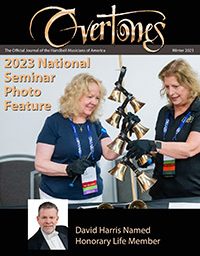by Linda Onorevole
Back in 2017, after completing a workshop at the Center for Public Interest Communications at the University of Florida, I wrote an article that was published in Florida Weekly as part of a series written by nonprofit administrators.

Linda Onorevole
Executive Director
The piece was about how music has affected my life. I recently came across the article and noticed how relevant it is to what we at Handbell Musicians of America are working on daily, and thought I would share an excerpt.
“Music is my constant companion. From singing in the car or at karaoke, to playing the piano, to composing, it is there to help me sort through the challenging—divorce, devastating family illnesses, a sometimes-crippling anxiety disorder—and revel in the wonderful—loving relationships, friendships, a fruitful career. Music: my buddy, my pal, my rock, is there to help me celebrate, process, or heal.
“In high school, I was part of an all-girls chorus. The immediate benefit was better self-esteem. I prepared for and survived an audition, and they picked me! Then I felt like I belonged to something bigger than myself, my part in the group mattered. Chorus was my life raft in the sea of emotions, hormones, and confusion of my teenage years.
“My choral director, Raymond Kohere, was instrumental in my development as a musician and person. He simultaneously challenged and encouraged, and his lessons in music were transferable to life—still are. Things like know your part because we are only as strong as our weakest link; stand on your own since you will be singing next to a person singing a different part than you; work together and blend, we are not 36 soloists. Mr. K. taught me more than singing. I learned about focus and commitment, and I developed courage and became a leader.”
It has been 34 years since I was in that choral classroom in Nutley, New Jersey, with the Choralettes, yet the lessons I learned then (as well as the repertoire!) still live in my mind and are relevant today.
While some people see music ensembles like choirs, bands, and handbell groups as just special subjects in school or hobbies, they are so much more. In addition to the musical proficiencies learned, these opportunities teach collaboration, leadership, problem solving, study skills, and help build self-esteem for people of all ages. Music can be an outlet and escape from whatever difficulties people are facing, and provide a way for us to collaboratively celebrate the joys.
This is precisely why we at Handbell Musicians of America are working to keep handbell and other musical ensembles in schools, communities, and places of worship. Advocacy, education, and communication are our tools to do this, and we need your help and voice, too! Please get involved where you live to support the arts in whatever way you can—contributing, serving on a board, attending events, volunteering, etc. Let’s work together to make certain these artistic opportunities continue and flourish around the country.
Linda Onorevole
[email protected]
The piece was about how music has affected my life. I recently came across the article and noticed how relevant it is to what we at Handbell Musicians of America are working on daily, and thought I would share an excerpt.
“Music is my constant companion. From singing in the car or at karaoke, to playing the piano, to composing, it is there to help me sort through the challenging—divorce, devastating family illnesses, a sometimes-crippling anxiety disorder—and revel in the wonderful—loving relationships, friendships, a fruitful career. Music: my buddy, my pal, my rock, is there to help me celebrate, process, or heal.
“In high school, I was part of an all-girls chorus. The immediate benefit was better self-esteem. I prepared for and survived an audition, and they picked me! Then I felt like I belonged to something bigger than myself, my part in the group mattered. Chorus was my life raft in the sea of emotions, hormones, and confusion of my teenage years.
“My choral director, Raymond Kohere, was instrumental in my development as a musician and person. He simultaneously challenged and encouraged, and his lessons in music were transferable to life—still are. Things like know your part because we are only as strong as our weakest link; stand on your own since you will be singing next to a person singing a different part than you; work together and blend, we are not 36 soloists. Mr. K. taught me more than singing. I learned about focus and commitment, and I developed courage and became a leader.”
It has been 34 years since I was in that choral classroom in Nutley, New Jersey, with the Choralettes, yet the lessons I learned then (as well as the repertoire!) still live in my mind and are relevant today.
While some people see music ensembles like choirs, bands, and handbell groups as just special subjects in school or hobbies, they are so much more. In addition to the musical proficiencies learned, these opportunities teach collaboration, leadership, problem solving, study skills, and help build self-esteem for people of all ages. Music can be an outlet and escape from whatever difficulties people are facing, and provide a way for us to collaboratively celebrate the joys.
This is precisely why we at Handbell Musicians of America are working to keep handbell and other musical ensembles in schools, communities, and places of worship. Advocacy, education, and communication are our tools to do this, and we need your help and voice, too! Please get involved where you live to support the arts in whatever way you can—contributing, serving on a board, attending events, volunteering, etc. Let’s work together to make certain these artistic opportunities continue and flourish around the country.
Linda Onorevole
[email protected]

Linda Onorevole
Executive Director

